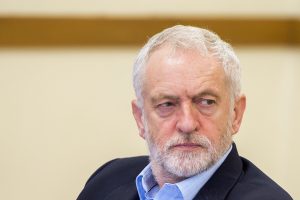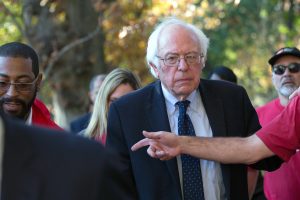American leftists who are tempted to sympathize with the British Labour Party leader, Jeremy Corbyn — don’t. He is not an overseas version of Bernie Sanders.
Both men were political outsiders for much of their careers until they unexpectedly rose to the tops of their respective parties. Both appeal to voters who are disillusioned with old politics. Both argue for a break with the neoliberal-tainted “Third Way” in social democracy.
But that is where the similarities end.
Unelectable
In Europe, Sanders would be a mainstream social democrat. His policies — universal health care, debt-free college education, higher taxes on the rich, tougher regulation of business — are hardly controversial here.
Corbyn, by contrast, would be entirely unelectable in the United States.
Indeed, the reason he has been at war with his own party, and one of the reasons seven lawmakers are leaving Labour today, is that many of his own colleagues doubt he is electable in the United Kingdom.
Corbyn’s views
Corbyn’s views are far, far to the left of the Vermont senator’s. He:
- Called for unilateral nuclear disarmament at the height of the Cold War and has promised that, if elected prime minister, he would never authorize the use of nuclear weapons;
- Opposed the 1982 Falklands War as a “Tory plot” and as recently as 2017 called for a “negotiated settlement” with Argentina, which still claims the island group in the South Atlantic despite its inhabitants’ nearly unanimous desire to remain British;
- Was considered so anti-Western that Czech intelligence targeted him for recruitment in 1986;
- During the Troubles in Northern Ireland, when the British center-left allied with the pro-unification but anti-terrorist Social Democratic and Labour Party, instead backed Sinn Féin and the Provisional IRA, which endorsed violence to bring about a united Ireland;
- Opposed NATO airstrikes against Serbia in 1999 and refused to believe that Slobodan Milošević was attempting a genocide against ethnic Albanians in Kosovo;
- Has called for NATO to be disbanded and blamed its “belligerence” (in a column for the communist Morning Star) for provoking Russia, accepting the Russian premise that countries in Central and Eastern European should not have been free to join the alliance;
- Hosted representatives of Hamas and Hezbollah, whom he called his “friends” and praised for their commitment to “peace and social justice”, but never reached out to Israeli or Jewish groups;
- Ignored warnings of growing antisemitism in his party, including a parliamentary inquiry that found Labour had become a safe space for “those with vile attitudes toward” Jews;
- Supported Hugo Chávez and supports his dictatorial successor, Nicolás Maduro, against the democratically elected opposition in Venezuela;
- On Iranian state television, of all places, criticized the killing of Osama bin Laden as a “tragedy”, lamenting that no attempt had been made to “arrest him and put him on trial”;
- Voted against bombing the self-declared Islamic State in Syria after the group claimed responsibility for terrorist attacks in Paris that killed more than 130; and
- In his most recent election campaign, promised to raise public spending by 65 percent to pay for subsidized housing, universal child care, the renationalization of rail and the revitalization of depressed cities and towns — without a plan to pay for it.


